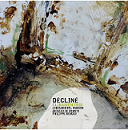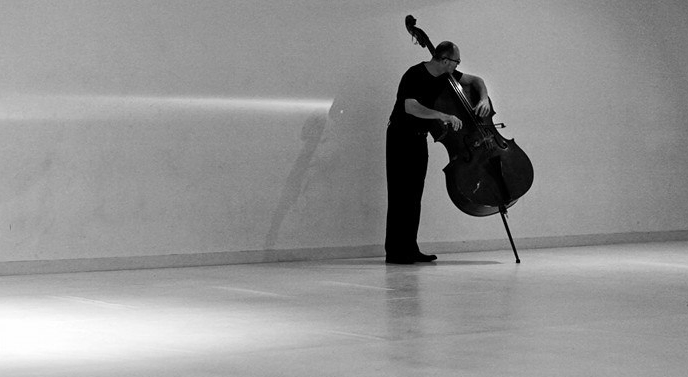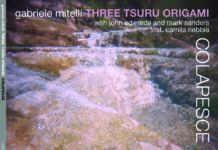When handled as a generator of sound, as French bassist Louis-Michel Marion does, the double bass reveals itself to be the versatile container of sonic multitudes that it is. That this is so is enhanced by Marion’s favoring of the expanded compass that his five-string instrument affords.
Marion’s training and influences reflect a melding of jazz and contemporary avant-garde and experimental composition that has become fairly prevalent among performers of freely improvised music. After a time playing blues rock bass, he studied double bass with Jean-François Jenny-Clark and Pierre Hellouin, and has played with American jazz musicians Joe McPhee and Steve Potter. Additionally, he cites Salvatore Sciarrino, Morton Feldman and Iannis Xenakis among others as significant sources of inspiration, and interestingly enough has a non-musical background in linguistics as well. Two recent releases allow him to develop his sound in both trio and solo settings.
 The Clinamen Trio, which in addition to Marion includes clarinetist Jacques Di Donato and violist Philippe Berger, improvises contemporary sound-based chamber music. Marion is right to assert that the trio’s name is apt: “Clinamen” derives from Lucretius’s Epicurean poem De rerum natura and describes the unpredictable zig-zag motions of atoms in space. More than simple mechanical movement, this seemingly indeterminate motion was supposed by the poet to constitute the basis for free will. The allusion to free will as well as unpredictable causal interactions seems a most fitting figure for a trio improvisation. Just how fitting can be heard on Décliné, released earlier this year. With their fine sensitivity to timbre and dynamics, the three create extended sounds that ricochet off of each other in abstract conjunctions and disjunctions—very much the sonic image of an intelligently guided Brownian motion, if such a thing can be imagined. The combination of high and low strings with a wind instrument provides just enough timbral grit; the clarinet’s feedback-like multiphonics and curt bursts play well off of the strings’ hard-edged tones, abrupt pizzicato and other percussive effects. A quiet interlude in the middle of the recording has the instruments’ individual identities effaced in a general surf of scraping, tapping, rubbing and skittering.
The Clinamen Trio, which in addition to Marion includes clarinetist Jacques Di Donato and violist Philippe Berger, improvises contemporary sound-based chamber music. Marion is right to assert that the trio’s name is apt: “Clinamen” derives from Lucretius’s Epicurean poem De rerum natura and describes the unpredictable zig-zag motions of atoms in space. More than simple mechanical movement, this seemingly indeterminate motion was supposed by the poet to constitute the basis for free will. The allusion to free will as well as unpredictable causal interactions seems a most fitting figure for a trio improvisation. Just how fitting can be heard on Décliné, released earlier this year. With their fine sensitivity to timbre and dynamics, the three create extended sounds that ricochet off of each other in abstract conjunctions and disjunctions—very much the sonic image of an intelligently guided Brownian motion, if such a thing can be imagined. The combination of high and low strings with a wind instrument provides just enough timbral grit; the clarinet’s feedback-like multiphonics and curt bursts play well off of the strings’ hard-edged tones, abrupt pizzicato and other percussive effects. A quiet interlude in the middle of the recording has the instruments’ individual identities effaced in a general surf of scraping, tapping, rubbing and skittering.
On 2015’s 5 Strophes, Marion plays solo. The five improvisations show him drawing some unexpected sounds from the instrument, at times making it seem as if it’s being run through a granular synthesizer in real time. He’s particularly skilled at creating simultaneously sounding independent lines rich in overtones and textured with ghost melodies flitting over slowly rolling drones. He does the sound in different voices, taking full advantage of the double bass’s potential for multi-string, autopolyphony.









